Key Takeaways
- eCommerce platforms offer diverse options to meet small business needs, with features like intuitive and easy design tools, robust eCommerce capabilities, and scalability to support growth.
- Gauss Box provides an all-in-one eCommerce platform with tools for inventory, sales, and customer management, making it a strong choice for businesses seeking seamless operations.
- Consider cost and pricing, including subscription fees, transaction fees, and additional expenses like hosting or plugins.
- Platforms like Shopify and BigCommerce provide multichannel selling, while WooCommerce and Squarespace allow for more customization.
- For branding-focused businesses, Squarespace stands out with visually striking templates, whereas Wix is ideal for flexibility and affordability.
- Tools like inventory management, payment integration, and marketing features are available across platforms to streamline your eCommerce website operations.
- Mobile responsiveness, security, and 24/7 customer support are vital for maintaining a smooth and trustworthy eCommerce business experience.
So, What are the Best eCommerce Platforms for Small Businesses?
1. Gauss Box
Pricing:
- Basic Web: €19.99/month
- Advanced Web & E-commerce: €59.99/month
- Professional Web & E-commerce: €149.99/month
- Free Trial: Available
Gauss Box is an eCommerce platform for small business owners looking for an all-in-one solution that simplifies operations.
It integrates e-commerce tools with CRM, project management, and document management, making it more than just a storefront builder.
For a small business ready to expand, it offers a scalable platform that supports growth by managing inventory, sales, and orders in one place.
You can also operate multiple e-commerce sites at once through its unified interface, which is especially helpful if your business grows and you need to expand your online presence.
Features like discounts, promotions, and coupon codes help you create engaging customer experiences, while payment methods like PayPal and Stripe give you flexibility.
Gaussbox also emphasizes security with SSL encryption and compliance for data protection.
If you’re looking for tools to help you gather insights, it provides shopping cart tracking and product review capabilities.
This solution for small businesses gives you the tools you need to manage your operations while supporting your transition to e-commerce.
Pros:
- Offers a comprehensive, all-in-one system
- Optimizes processes with AI-driven tools
- Modular design lets you adapt features to your needs
Cons:
- Limited market presence and user reviews
- May take time to learn because of its extensive features
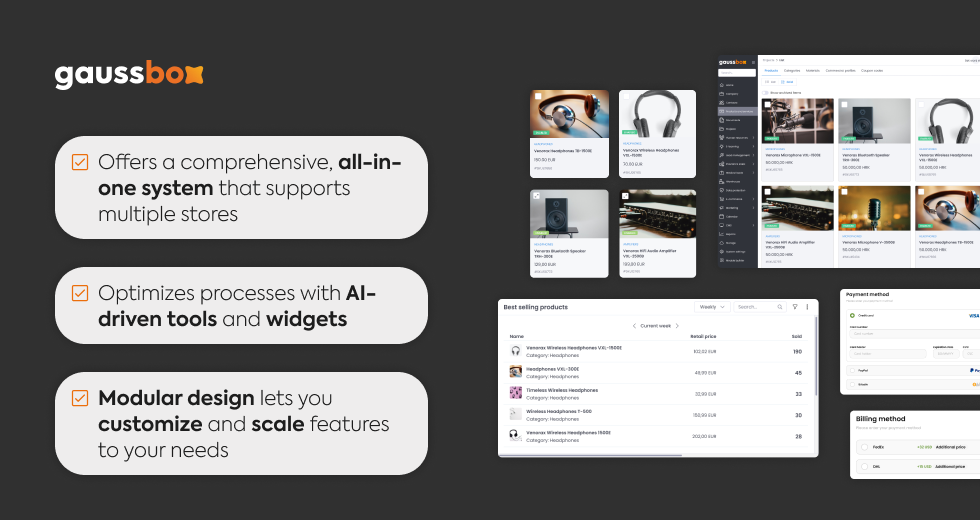
2. Shopify
Pricing:
- Basic Plan: $29/month
- Shopify Plan: $79/month
- Advanced Plan: $299/month
- Free Trial: 3 days, with $1/month for the first 3 months
Shopify is one of the most popular eCommerce platforms, offering a complete solution for businesses of all sizes.
Whether you're starting fresh or expanding, Shopify provides an intuitive way to create and manage your online store.
It stands out for its multichannel capabilities, letting you sell on your website, social media, marketplaces, and even in-person through its POS integration.
This eCommerce platform for small businesses comes with over 100 customizable themes and a drag-and-drop editor to create your storefront without coding.
Additional features like built-in SEO, email marketing tools, and abandoned cart recovery make it easier to attract and retain customers.
Shopify provides seamless integration with thousands of apps, so you can tailor your store to meet your specific needs.
To save on transaction fees, you can use Shopify Payments, which is included in all plans.
If you need help, you’ll find their 24/7 customer support reliable and accessible, making this platform particularly user-friendly for newcomers and seasoned business owners alike.
Pros:
- Easy-to-use interface
- Offers reliable, round-the-clock customer support
- Includes hosting and security
Cons:
- Subscription fees can add up over time
- Transaction fees apply unless you use Shopify Payments
- Customization is more limited compared to open-source platforms
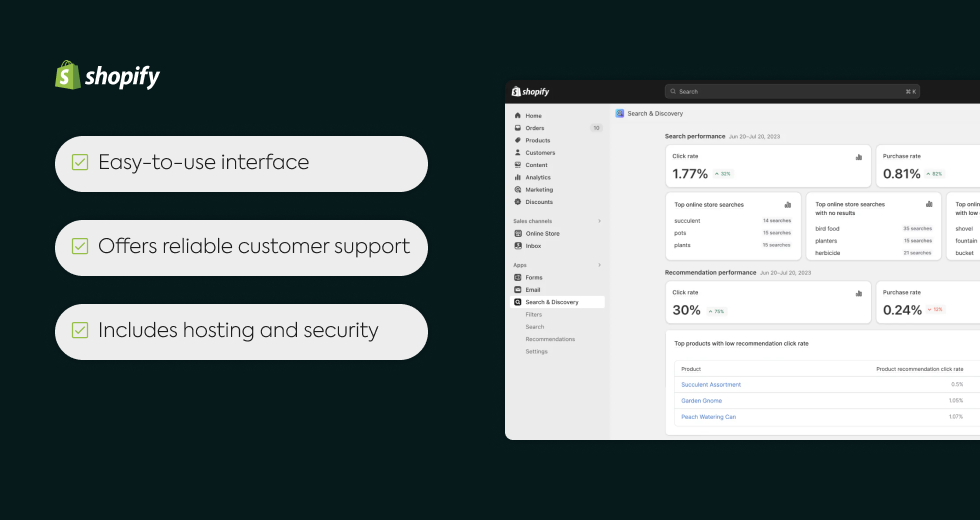
3. WooCommerce
Pricing:
- Free plugin: additional costs depend on hosting provider and extensions
- Free Trial: Not applicable (as the plugin itself is free)
WooCommerce is a great choice if you’re already using WordPress and want to add an eCommerce platform for small businesses to your site.
It’s an open-source plugin, meaning it’s free to start, but you’ll need to factor in costs for hosting, themes, and any extra features you might need.
Because it integrates seamlessly with WordPress, WooCommerce gives you complete control over your online store’s layout and functionality, making it perfect for those who want a highly customizable platform.
This option supports payment gateways, automated tax calculations, and shipping management, offering flexibility for all kinds of products, including digital downloads, subscriptions, and physical items.
With access to thousands of WordPress themes and plugins, you can create a storefront tailored to your exact needs.
For beginners or those unfamiliar with WordPress, there are extensive resources and tutorials to help you get started.
Pros:
- Full customization to suit your business needs
- Avoids platform transaction fees
- Thousands of plugins and themes to enhance functionality
Cons:
- Requires technical knowledge to set up and maintain
- Hosting and security involve additional costs
- Necessary extensions can make it more expensive
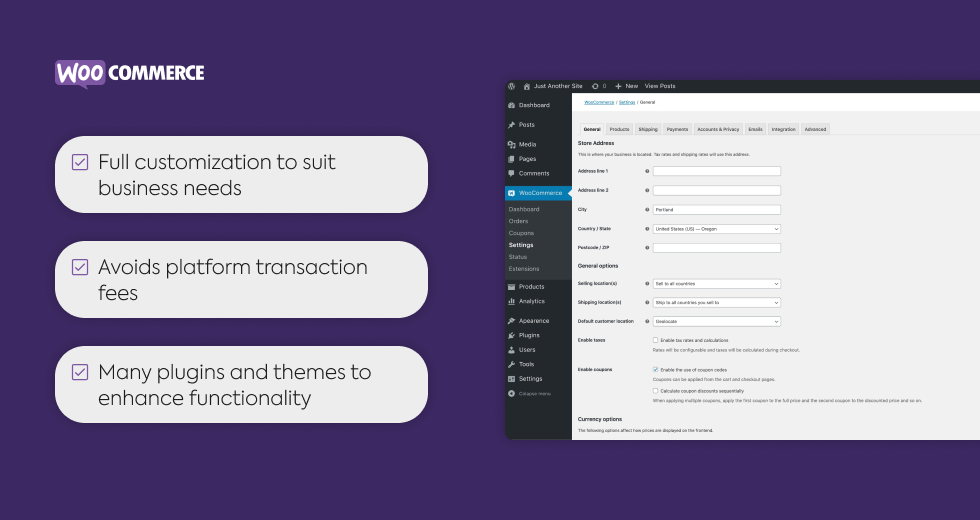
4. Squarespace
Pricing:
- Business Plan: $33/month
- Commerce Basic: $36/month
- Commerce Advanced: $65/month
- Free Trial: 14 days, with a one-time extension available
Squarespace is a website builder that combines stunning designs with e-commerce functionality.
Initially built for showcasing portfolios and creative projects, it has grown into an excellent option for small business owners looking to sell online.
Its templates are sleek and customizable, making it a good fit if branding is a top priority for your business.
The drag-and-drop editor is easy to use, even for beginners, so you can set up your site quickly without any coding.
With Squarespace, you’ll find all the eCommerce features you need, like product listings, subscription tools, and the ability to sell digital downloads.
Marketing is simplified with integrated email campaigns and social media tools, while SEO and analytics features help you track performance and optimize your efforts.
Payment processing is straightforward, with trusted gateways like Stripe and PayPal included.
Pros:
- Offers visually appealing templates ideal for branding
- Easy to use, especially for beginners
- Built-in tools for marketing, analytics, and hosting
Cons:
- Less scalable for fast-growing or large businesses
- Transaction fees apply on lower-tier plans
- Fewer integrations compared to other platforms
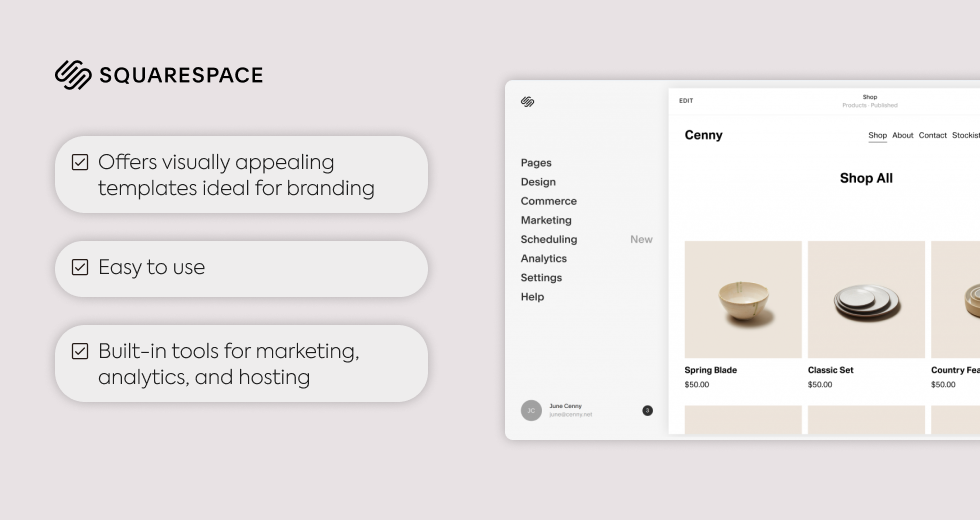
5. Wix
Pricing:
- Business Basic: $23/month
- Business Unlimited: $27/month
- Business VIP: $49/month
- Free Trial: Not available; free plan includes Wix branding, but e-commerce features require a paid plan
Wix is a website builder designed for flexibility, offering over 500 templates tailored to different industries.
It includes eCommerce features like inventory management, order tracking, and subscription billing, all accessible through an intuitive drag-and-drop interface.
This makes it particularly appealing to small business owners who want to set up an online store quickly without much technical knowledge.
With Wix, you can sell on multiple channels, including social media platforms and online marketplaces.
Marketing tools like abandoned cart recovery and email campaigns help drive sales, while integration with third-party apps expands functionality.
It’s an affordable option for those on a budget, though it’s best suited for smaller catalogs or less complex needs.
Pros:
- User-friendly interface, perfect for beginners
- Lower pricing compared to some competitors
- Supports subscription billing and dropshipping through add-ons
- Paid plans eliminate transaction fees
Cons
- Limited scalability for larger businesses
- Some templates may cause slower page load times
- Once you choose a template, you can’t change it without rebuilding your site
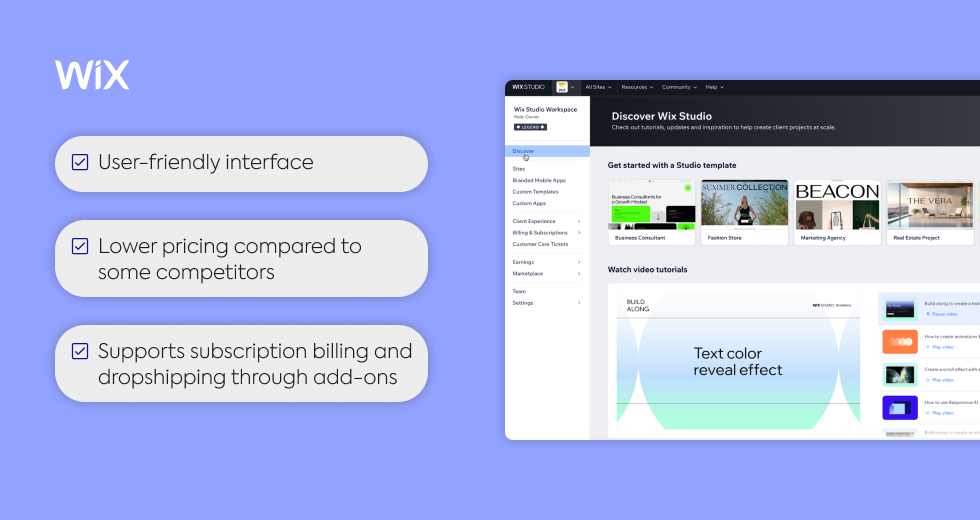
6. BigCommerce
Pricing:
- Standard Plan: $29.95/month
- Plus Plan: $79.95/month
- Pro
Plan: $299.95/month
- Free plan: 15 days
BigCommerce is a powerful eCommerce platform that works well for small and growing businesses alike.
It offers unlimited products, bandwidth, and staff accounts on all plans, making it highly scalable as your business grows.
You’ll also find built-in tools for SEO, marketing, and analytics to help improve visibility and sales performance.
Selling through multiple channels is simple, with options to list products on social media, marketplaces, and search engines.
The platform allows you to customize the checkout process, and since it doesn’t charge transaction fees, it can be a cost-efficient choice for businesses with high sales volumes.
While it’s feature-rich, beginners might find the learning curve a bit steeper compared to other platforms.
Pros:
- Comprehensive tools for scaling businesses
- Supports unlimited products and bandwidth on all plans
- Strong SEO features and marketing integrations
- No transaction fees
Cons:
- Can be harder to use for beginners
- Limited free templates, and premium themes may add costs
- Plans include revenue caps, which could require upgrading as sales grow
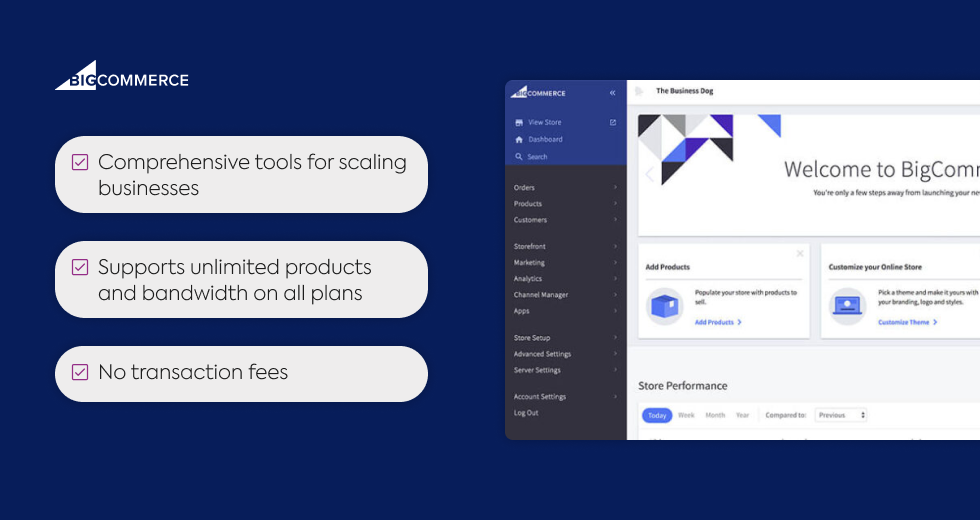
7. Square Online
Pricing:
- Free Plan: $0 (includes Square branding)
- Professional: $12/month
- Performance: $26/month
- Premium: $72/month
- Free Trial: No free trial for paid plans; free plan available
Square Online integrates perfectly with Square’s POS system, making it ideal if you’re managing both in-person and online sales.
It provides pre-designed templates you can customize with a simple drag-and-drop editor.
Inventory management, order tracking, and delivery tools are included to help you run your online store smoothly.
The free plan gives you basic e-commerce functionality, which is great for businesses on a tight budget, while paid plans add advanced features like analytics and custom domains.
Payment processing is flexible, with options like PayPal, Apple Pay, Google Pay, and Square’s own gateway.
This platform is a solid choice if you have a smaller catalog or need a solution for small businesses focused on hybrid sales.
Pros:
- Easy integration with Square POS for businesses selling in-person and online
- Free plan available, reducing upfront costs
- Straightforward interface with tools to manage your store
- Competitive pricing with multiple payment options
Cons:
- Fewer customization options compared to competitors
- Advanced features like custom domains require a paid plan
- Works best for smaller product catalogs
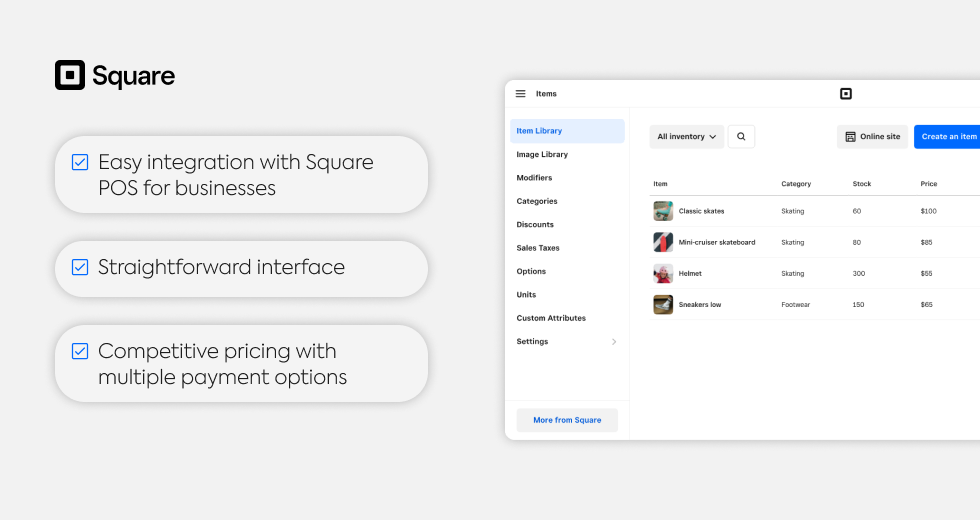
How to Choose the Best eCommerce Platform for Your Small Business
When searching for the right eCommerce platform, there’s no one-size-fits-all answer.
Different platforms offer a variety of features and pricing models, so it’s important to focus on what works best for your business.
Here are key points to consider when narrowing down your platform options.
Cost and Pricing
For small business owners, the budget is often a deciding factor.
Make sure to look at both upfront and ongoing costs, such as hosting fees, transaction fees, and any additional plug-ins you may need.
While some platforms offer a free trial or starter plans, others might require larger commitments.
The best approach is to look for platforms that offer the features you need without stretching your budget too thin.
Ease of Use
If you’re a new business owner or lack technical experience, choosing an eCommerce platform with an intuitive interface can save you time and frustration.
Tools like drag-and-drop editors simplify website building and let you focus on creating your storefront rather than troubleshooting software.
This is especially helpful for those who want a solution tailored for small businesses.
Scalability
Think about where your business might be a year from now.
Whether you expect steady growth or a seasonal sales spike, the platform for your small business should be able to handle increased traffic and sales volume.
Scalability ensures you won’t outgrow your platform as your business expands.
Customization Options
To stand out, your store needs to reflect your brand.
The best solution is a platform that allows you to customize your site’s layout, design, and functionality to fit your business needs.
If branding is important to you, check whether the platform supports advanced design tools or integrations that give you the flexibility you need.
Security
With online shopping, security is a priority.
Platforms that are PCI compliant and offer SSL certificates help protect customer data.
Additionally, features like fraud detection and secure payment gateways ensure your customers have a safe shopping experience.
Integration Capabilities
Your platform should work seamlessly with the tools you already use, whether it’s CRM software, email marketing services, or accounting systems.
Strong integration capabilities make daily operations easier and let you focus on growing your business.
Mobile Responsiveness
More shoppers are browsing and buying on mobile devices.
A perfect eCommerce platform will offer mobile-optimized themes or templates to ensure your site performs well on any screen size.
Mobile responsiveness isn’t just about looks—it can also affect your store’s SEO and sales.
Customer Support
When something goes wrong, having reliable support can make all the difference.
Look for platforms with 24/7 customer service or robust help centers.
Having access to quick answers will save you time and keep your store running smoothly.
Marketing Tools
To drive sales, consider a platform with built-in marketing features like SEO optimization, email campaigns, and abandoned cart recovery.
These tools help you reach your audience and encourage repeat purchases, making them essential for small business owners who want to grow their customer base.
Inventory Management
Managing your stock can get complicated, especially as your business scales.
Platforms with features like bulk import/export options and stock alerts help you stay organized.
For businesses with a large or growing inventory, robust tools can save time and reduce errors.
Payment Options
Offering a variety of payment options is important for accommodating different customers.
Look for platforms that support credit cards, digital wallets, and flexible options like Buy Now Pay Later.
Giving shoppers more ways to pay can reduce cart abandonment and boost sales.
Trial and Demonstrations
Testing a platform before committing can save you from costly mistakes.
Many options on the market offer free trials or demos, so you can evaluate whether the platform meets your business needs without risk.
Reviews and Recommendations
Learning from others can provide valuable insights.
Check reviews from small business owners to see what worked well for them and what didn’t.
This feedback helps you discover the best eCommerce platform based on real experiences.
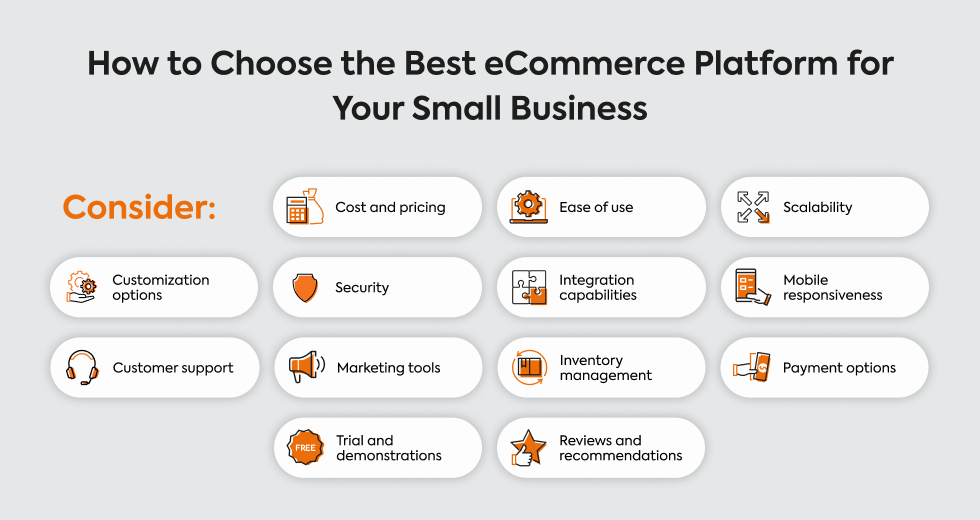
Ready to Take Your eCommerce Venture to the Next Level?
You've explored the best eCommerce platforms to find the perfect fit for your small business. But what if your needs go beyond the ordinary?
At Gauss, we specialize in crafting custom solutions that address your unique challenges, no matter how complex.
With Gauss Box, we offer an all-in-one platform that seamlessly integrates eCommerce with CRM, project management, and more—giving you the tools to scale confidently.
Let us help you transform your vision into reality. Whether you’re launching your first online store or optimizing for growth, our team is here to guide you every step of the way.
Contact Gauss today to start a conversation about how we can make your project a success.
